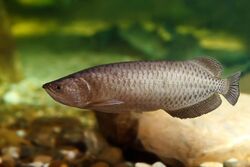Biology:Scleropages
| Scleropages | |
|---|---|

| |
| Scleropages jardinii | |
| Scientific classification | |
| Domain: | Eukaryota |
| Kingdom: | Animalia |
| Phylum: | Chordata |
| Class: | Actinopterygii |
| Order: | Osteoglossiformes |
| Family: | Osteoglossidae |
| Genus: | Scleropages Günther, 1864 |
| Type species | |
| Scleropages leichardti Günther, 1864
| |
Scleropages is a genus of fish in the family Osteoglossidae found in Asia and Australia .[1] All of these species are carnivorous and have great jumping ability. These species are highly valued as aquarium fish, particularly by those from Asian cultures. In 2003, a study redescribed several naturally occurring color varieties of S. formosus into four separate species.[2] The majority of researchers dispute these redescriptions, arguing that the published data are insufficient to justify recognizing more than one Southeast Asian species of Scleropages and that divergent haplotypes used to distinguish the color strains into isolated species were found within a single color strain, contradicting the findings. They are considered monotypic, consisting of closely related haplotypes based on color.[3][4] The ancestor of the Australian arowanas: S. jardinii and S. leichardti, diverged from the ancestor of the Asian arowanas about 140 million years ago, during the Early Cretaceous period. The morphological similarity of all seven species shows that little evolutionary change has taken place recently for these ancient fish. The genus had a much wider distribution during the early Cenozoic, with fossil remains known from the Paleocene of Niger and Belgium,[5] and from the Eocene of China .[6][7]
Species
There are currently 4 recognized species in this genus:
| Image | Scientific name | Common Name | Distribution |
|---|---|---|---|
 |
Scleropages formosus (S. Müller & Schlegel, 1840) | Asian bonytongue; green arowana,[8] Asian arowana | Thailand, Cambodia, southern Vietnam, Malay Peninsula, Sumatra, West Borneo |
| Scleropages inscriptus T. R. Roberts, 2012 [9] | Myanmar bonytongue, Scripted arowana, inscriptus arowana | Myanmar | |
 |
Scleropages jardinii (Saville-Kent, 1892) | Australian bonytongue, northern barramundi, Jardini arowana | Gulf of Carpentaria drainage system, west to the Adelaide River in the Northern Territory, throughout northern Queensland and in New Guinea |
 |
Scleropages leichardti Günther, 1864 | Spotted bonytongue/Saratoga[10] | Fitzroy River system Australia |
Phylogeny
Phylogeny based on the work of Pouyaud, Sudarto & Teugels 2003.[2]
| Osteoglossidae |
| ||||||||||||||||||||||||||||||||||||||||||
References
- ↑ Froese, Rainer and Pauly, Daniel, eds. (2016). Species of Scleropages in FishBase. October 2016 version.
- ↑ 2.0 2.1 Pouyaud, L.; Sudarto; Teugels, G.G. (2003). "The different colour varieties of the Asian arowana Scleropages formosus (Osteoglossidae) are distinct species: morphologic and genetic evidences". Cybium 27 (4): 287–305.
- ↑ Mohd-Shamsudin, M.I.; Zahedi Fard, M.; Mather, P.B.; Suleiman, Z.; Hassan, R.; Othman, R.Y.; Bhassu, S. (2011). "Molecular characterization of relatedness among colour variants of Asian Arowana (Scleropages formosus)". Gene 490 (1–2): 47–53. doi:10.1016/j.gene.2011.08.025. PMID 21945689.
- ↑ Mu, X.-D.; Song, H.-M.; Wang, X.-J.; Yang, Y.-X.; Luo, D.; Gu, D.-E.; Luo, J.-R.; Hu, Y.-C. (2012). "Genetic variability of the Asian arowana, Scleropages formosus, based on mitochondrial DNA genes". Biochemical Systematics and Ecology 44: 141–148. doi:10.1016/j.bse.2012.04.017.
- ↑ Taverne, L. (2009): On the presence of the osteoglossid genus Scleropages in the Paleocene of Niger, Africa (Teleostei, Osteoglossomorpha). Bulletin de l'Institut royal des Sciences naturelles de Belgique, Science de la Terre, 79: 161-167.
- ↑ Jiang-Yong Zhang; Mark V. H. Wilson (2017). "First complete fossil Scleropages (Osteoglossomorpha)". Vertebrata PalAsiatica 55 (1): 1–23. http://www.ivpp.cas.cn/cbw/gjzdwxb/xbwzxz/201701/t20170118_4738296.html.
- ↑ Jiang-Yong Zhang (2020). "A New Species of Scleropages (Osteoglossidae, Osteoglossomorpha) from the Eocene of Guangdong, China". Vertebrata PalAsiatica 58 (2): 100–119. doi:10.19615/j.cnki.1000-3118.191213. http://www.ivpp.cas.cn/cbw/gjzdwxb/xbwzxz/201912/t20191213_5453116.html.
- ↑ van Oijen, M.J.P.; van der Meij, S.E.T. (2013). "The types of Osteoglossum formosum Müller & Schlegel, 1840 (Teleostei, Osteoglossidae)". Zootaxa 3722 (3): 361–371. doi:10.11646/zootaxa.3722.3.5. PMID 26171532. http://www.mapress.com/zootaxa/2013/f/zt03722p371.pdf.
- ↑ Roberts, T.R. (2012): Scleropages inscriptus, a new fish species from the Tananthayi or Tenasserim River basin, Malay Peninsula of Myanmar (Osteoglossidae: Osteoglossiformes). aqua, International Journal of Ichthyology, 18 (2): 113-118.
- ↑ Pusey, B.J.; Fisher, C.; Maclaine, J. (2016). "On the nature of Scleropages leichardti Günther, 1864 (Pisces: Osteoglossidae)". Zootaxa 4173 (1): 75–84. doi:10.11646/zootaxa.4173.1.7. PMID 27701205.
Wikidata ☰ Q1766674 entry
 |

